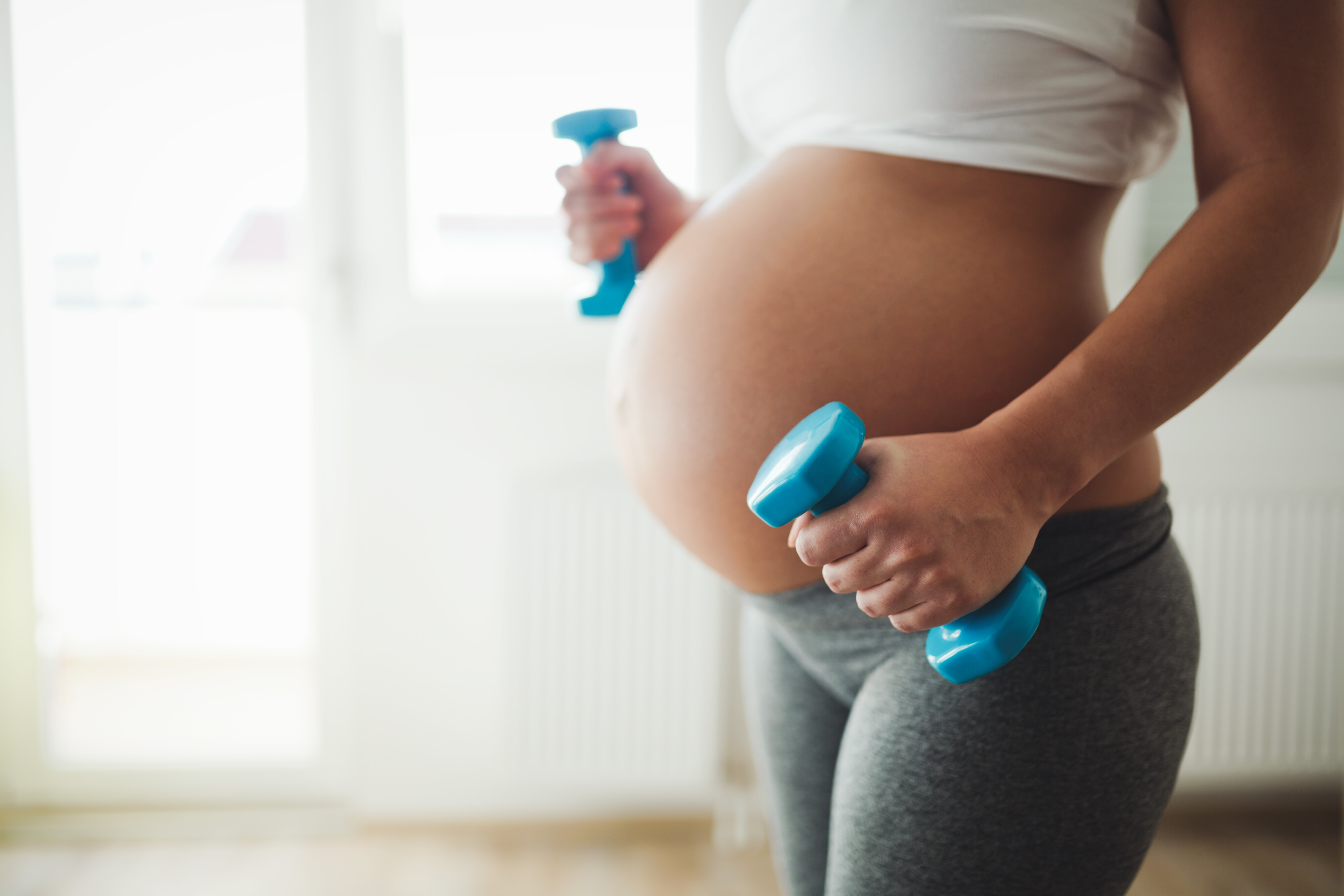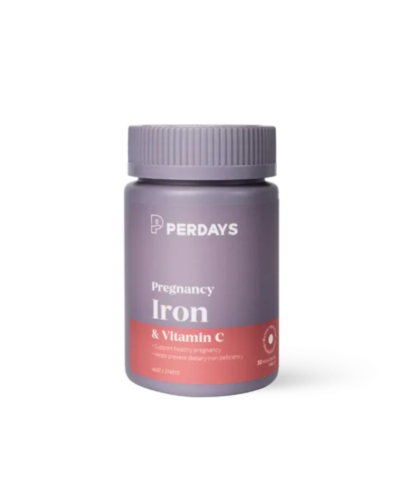Contents
- Is Iron Important for Pregnancy?
- Can Iron Deficiency in Pregnancy Affect Baby’s Growth?
- How to Increase Iron Levels Quickly in Pregnancy?
- How Long Do Iron Tablets Take to Work?
- Does Black Poop Mean Iron Tablets Are Working?
- When to Take Iron Tablets?
- Do Iron Tablets Make You Constipated?
- Why Is My Body Not Absorbing Iron Supplements?
Iron in Pregnancy: Importance, Supplements, and Common Questions Answered
By Perdays Team
In a Nutshell
Maintaining proper iron levels is essential for both the mother’s health and the growth of the foetus throughout pregnancy. Premature birth, intrauterine growth restriction, and poor foetal growth are just a few of the issues that can arise from iron deficiency during pregnancy. In this post, we’ll look at the value of iron during pregnancy, how to raise your iron levels, the effectiveness of iron supplements, and answer some frequently asked questions.
Is Iron Important for Pregnancy?
Absolutely! Iron is crucial to the formation of haemoglobin, a protein that transports oxygen to the body’s cells, and so iron is essential during pregnancy. Extra iron is required during pregnancy to support the expanded blood volume and supply oxygen to the developing foetus. Iron deficiency anaemia during pregnancy can result from dietary iron deficiency and cause symptoms like weakness and fatigue.
Can Iron Deficiency in Pregnancy Affect Baby’s Growth?
Yes, pregnancy-related iron deficiency can have a negative impact on the baby’s growth and development. According to studies, low iron levels are linked to an increased risk of preterm and intrauterine growth restriction. Promoting good foetal growth and development requires ensuring appropriate iron intake.
How to Increase Iron Levels Quickly in Pregnancy?
Fortunately, there are several options to safely raise iron levels during pregnancy:
Consume Foods Rich in Iron: Eat foods high in iron, such as lean red meat (and organ meats), pork, poultry, oysters, spinach (and dark leafy greens), white beans, quinoa, mushrooms and fortified cereals, as part of your diet. These foods can improve iron absorption when combined with vitamin C-rich foods like bell peppers, kiwi fruit or citrus fruits.
Taking iron supplements: If your healthcare professional advises it, taking iron supplements can help to raise your iron levels. Preferably, choose an iron supplement designed especially for pregnant women. Do not forget to take supplements as directed and talk to your healthcare practitioner before beginning any new supplements.
How Long Do Iron Tablets Take to Work?
Replenishing the body’s iron stores typically takes two to three weeks with iron supplementation. The improvement of your symptoms, however, can take more time. Continue taking the supplements as directed by your healthcare practitioner with patience. Consult your healthcare professional for more advice if you don’t feel better or have any concerns.
Does Black Poop Mean Iron Tablets Are Working?
Yes, dark stools may indicate that an iron supplement is doing its job. The stool may seem darker or even black after taking an iron supplement. The typical shift in colour is brought on by the digestive system’s breakdown of iron. However, it’s always a good idea to visit your healthcare professional for additional evaluation if you have concerns about the colour of your faeces or suffer any symptoms you find disturbing.
When to Take Iron Tablets?
Iron is best absorbed when taken with food or immediately after meals. Combining iron supplements with vitamin C-rich foods or drinks can further enhance iron absorption. However, certain substances like calcium, tea, coffee, and dairy products can hinder iron absorption. Therefore, it’s advisable to separate the consumption of these substances from your iron supplements by at least two hours.
Do Iron Tablets Make You Constipated?
The optimum time to take iron is with food or right after eating. Iron absorption can be further improved by consuming foods or beverages high in vitamin C together with iron supplementation. But some things, like calcium, tea, coffee, and dairy products, can prevent the body from absorbing iron. So it’s best to wait at least two hours between consuming these things and taking iron supplements.
Why Is My Body Not Absorbing Iron Supplements?
Due to specific causes, such as malabsorption, some people may have trouble absorbing iron. Malabsorption can happen when the body has trouble effectively absorbing nutrients. Iron absorption can be impacted by illnesses including celiac disease, inflammatory bowel disease, or past stomach operations. It is crucial to talk to a healthcare professional about your concerns if you think you may be having iron absorption problems so they can assess the situation and make the necessary recommendations.
Maintaining Optimal Iron Levels for a Healthy Pregnancy
Ensuring adequate iron intake is vital for a healthy pregnancy. Along with a well-balanced diet rich in iron, supplementation can be beneficial if recommended by your healthcare provider. Remember to follow their guidance regarding dosage and timing. If you have any concerns or questions about iron supplements, iron levels, or overall health during pregnancy, always consult with your healthcare provider for personalised advice.
Support Your Pregnancy With Perdays Iron with Vitamin C
Perdays Pregnancy Iron & Vitamin C Specifically formulated for pregnant women to help support a healthy pregnancy. Our supplement contains highly bioavailable iron in the form of iron bisglycinate and vitamin C to optimize a healthy pregnancy.
References
- https://www.ncbi.nlm.nih.gov/pmc/articles/PMC7492370/#:~:text=Iron%20deficiency%20is%20associated%20with,prematurity%20and%20intrauterine%20growth%20restriction.
- https://www.ucsfhealth.org/education/anemia-and-pregnancy#:~:text=Eat%20iron%2Drich%20foods%20such,than%20the%20iron%20in%20vegetables.
- chrome-extension://efaidnbmnnnibpcajpcglclefindmkaj/https://www.health.qld.gov.au/__data/assets/pdf_file/0023/150089/antenatal-iron.pdf
- chrome-extension://efaidnbmnnnibpcajpcglclefindmkaj/https://intermountainhealthcare.org/ckr-ext/Dcmnt?ncid=520843231#:~:text=%E2%80%93%20It%20usually%20takes%202%20to,if%20your%20symptoms%20have%20improved.
- https://medlineplus.gov/ency/article/007478.htm#:~:text=Black%20stools%20are%20normal%20when,looking%20as%20well%20as%20black
- https://www.mayoclinic.org/drugs-supplements/iron-supplement-oral-route-parenteral-route/proper-use/drg-20070148#:~:text=Iron%20is%20best%20absorbed%20when,food%20or%20immediately%20after%20meals.
- https://myhealth.alberta.ca/Health/aftercareinformation/pages/conditions.aspxhwid=ug5526#:~:text=Iron%20pills%20may%20cause%20stomach,This%20is%20normal.
- https://www.nhsinform.scot/illnesses-and-conditions/nutritional/iron-deficiency-anaemia#:~:text=Malabsorption%20is%20when%20your%20body,of%20your%20stomach%20(gastrectomy).

